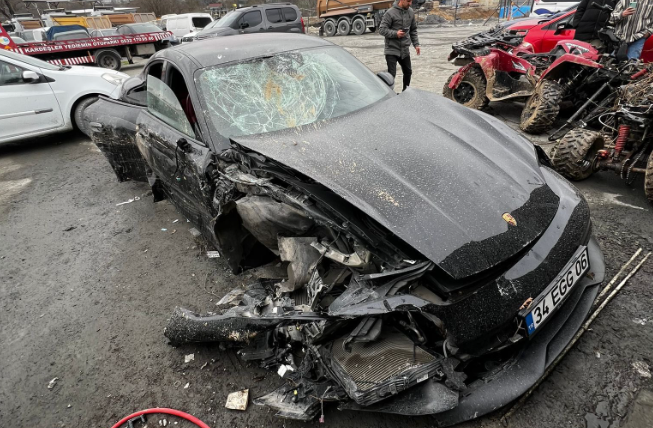Bünyamin Tekin
A fatal car accident in İstanbul on Friday has once again raised Turkey’s long-standing problems with accountability, especially when it comes to the wealthy and well-connected.
The accident, caused by a vehicle driven by the 17-year-old son of Turkish writer Eylem Tok, led to the death of Oğuz Murat Aci, the father of a young daughter and a quad bike enthusiast, and the injury of four others at the scene, sparking widespread outrage and reigniting debates about justice and privilege in Turkey.
According to the Turkish media, the accident occurred when Aci and his friends, who were traveling on quad bikes, stopped on the shoulder due to a mechanical problem. While attempting to warn oncoming traffic, Aci was fatally struck by a vehicle driven by T.C., Tok’s underage son who did not have a driver’s license.
After the accident, T.C. called his mother and asked for help. Tok rushed to the scene of the accident, put her son in her own car and drove away.
Instead of helping the victims, Tok is accused of taking her son away from the scene of the accident, leaving the injured and the deceased behind, and allegedly tampering with evidence.
The vehicle involved in the accident was left at the scene. The police investigation revealed that Tok took her son T. C. to the airport at 2:00 a.m. local time and flew to Egypt from there.
Detention warrants were issued for Tok and her son. Turkey’s Justice Ministry is seeking an INTERPOL Red Notice for them.

News of the incident and T.C.’s flight out of the country sparked outrage on social media.
The writer later declared on social media her intention to return to Turkey and face the legal consequences — a statement that was met with skepticism by those familiar with similar incidents in the past where influential people have seemingly avoided full responsibility for their actions.
The Turkish judicial system’s response to incidents of this nature, where the perpetrator is either wealthy or well-connected, has been criticized as favoring the perpetrators.
Comparisons have been drawn to other notable cases, such as the lenient sentencing of the Somali president’s son for a fatal accident in İstanbul that resulted in him getting off scot-free, the decision not to prosecute the suspicious death of 11-year-old Rabia Naz despite allegations of a cover-up of a fatal car accident and alleged “blood money” settlements that allowed some wealthy individuals to escape harsher legal consequences.
An İstanbul court has handed down a prison sentence of two-and-a-half years to a son of the Somali president who was involved in a deadly car accident in Turkey in November but converted it into a fine of TL 27,300 ($906)
Kirsche Schnee https://t.co/eTmObCfi78
— Menschenwürde für alle (@menschenwuerdee) January 19, 2024
These cases have helped to create the impression of a two-tier system of justice, where money and connections can be the deciding factor.
Critics argue that this reflects a broader erosion of the rule of law in Turkey, particularly following a 2016 coup attempt and the subsequent dismissal of over 4,000 judges and prosecutors.
In a development that validated the critics, Turkey was ranked 117th out of 142 countries in the World Justice Project’s (WJP) Rule of Law Index in October, dropping one place from last year.
Critics argue that such incidents highlight a systemic problem within the Turkish judicial system, where a lack of independence and alleged corruption lead to arbitrary prosecutions.
The public has reacted to these incidents with outrage. Social media campaigns have pointed to the growing dissatisfaction of the Turkish people with the state of the judiciary in their country.
There seems to be confusion as to how this circumvention of justice comes about. The Turkish media reports that the perpetrators are offering “blood money” to the families of victims and that the case is closed.
Is it so easy for the judiciary to close the investigation after a fatal car accident?
“The Turkish Penal Code defines this crime, namely traffic accidents in which someone is responsible for the death of another, as ‘reckless homicide,’ and the prosecution of this crime does not depend on the complaint of an injured party. Even if the injured party, let’s say his family, withdraws their complaint, the public proceedings will continue,” explains Brussels-based lawyer Ali Yıldız.
“Any person who causes the death of another by reckless conduct shall be sentenced to a penalty of imprisonment for a term of two to six years. If the act results in the death of more than one person, or the injury of more than one person together with death of one or more persons, the offender shall be sentenced to a penalty of imprisonment for a term of two to fifteen years,” reads Article 85 of the Turkish Penal Code.
“There can be various elements in causing death by recklessness in traffic accidents. For example, the perpetrator may have been drinking alcohol and driving under the influence of alcohol. Although the offender foresaw that he could have an accident, he did not want an accident. Although he was drunk, he trusted himself and thought that the accident would not happen. Similarly, the offender may have been speeding and caused an accident, trusting that he would not have an accident. The decisive factor here is that the offender did not want this consequence to occur, even though he foresaw it,” Yıldız says.
“In blood money settlements, it happens that the injured party, often the victim’s family, withdraws their claim. If the reckless behavior in question is not so serious, which is at the discretion of the judge, then after the victim’s family withdraws their complaint, judges tend to impose lenient sentences, which are often commuted to fines, leading to the release of the offender,” according to Yıldız.
“That is not to say corruption is not at play,” he adds and refers to the fact that the Turkish judiciary is rife with allegations of corruption.
An İstanbul prosecutor exposed alleged corruption in Turkey’s judicial system in a letter to the country’s highest judicial body last year.
A letter sent in October to the Council of Judges and Prosecutors’ (HSK) secretary-general by İsmail Uçar, the then-chief public prosecutor of İstanbul, in which he detailed allegations of bribery, nepotism and other irregularities in the judicial system sent shockwaves within the judiciary, which many say has suffered significant erosion and lost its independence under the rule of President Recep Tayyip Erdoğan.
Following Uçar’s letter, Justice Minister Yılmaz Tunç said at the time that the HSK had initiated an investigation into the allegations and that an inspector had been assigned to the case.
Uçar’s allegations have only led to the suspension of one judge so far.
The ruling Justice and Development Party (AKP) government is accused of replacing the judicial members who were removed under the pretext of an anti-coup fight after the failed coup in July 2016 with young and inexperienced judges and prosecutors who have close links to the AKP.
Rabia Naz’s death
For Yıldız, this clearly affects the outcome of many criminal cases. He deplores the ingrained culture of humiliating oneself for hush money and withdrawing charges.
However, if you do not do this, like Şaban Vatan, the father of 11-year-old Rabia Naz Vatan, you can also expect consequences.
A newly emerged video footage shows the moment Istanbul police used excessive force against a group of high school students protesting the suspicious death of a 11-year-old Turkish girl, Rabia Naz Vatan || https://t.co/6pGWZzq77r pic.twitter.com/tEXJqL8MGG
— Frank S Wise (@FrankSW_TX) November 18, 2019
Rabia Naz was found dead on April 13, 2018 near her apartment in the Eynesil district of Turkey’s northern Giresun province.
The autopsy indicated that she died of broken bones and visceral organ damage that could have been inflicted by a fall from the apartment in which the Vatan family was living.
However, her father claimed she was hit by a car and dragged close to the apartment with the evidence rubbed off her clothes. Vatan alleged that the car was driven by the nephew of Coşkun Somuncuoğlu, a former mayor of the district from the ruling AKP.
He later added that Nurettin Canikli, a former AKP minister, had weighed in to cover up the death.
In 2020, as part of the case launched after Canikli filed a complaint against Vatan over his allegations, Vatan was given a prison sentence of almost two years and a fine of TL 8,840 ($1,169) by a local court for “illegally obtaining and disseminating personal information” and “insulting a public officer,” respectively.
Vatan’s allegations were brought to public notice and sparked several social media campaigns with the help of freelance journalist Metin Cihan, who left Turkey in 2020, saying he had received death threats.
Time will tell whether the death of Oğuz Murat Aci will lead to accountability, but one thing is certain: Many Turks do not trust their courts to deliver justice and feel helpless and insecure when confronted by the powerful, the wealthy and the well-connected.
